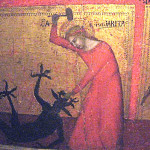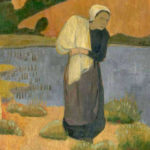We run our website the way we wished the whole internet worked: we provide high quality original content with no ads. We are funded solely by your direct support. Please consider supporting this project.

6 Things the Church Fathers Can Teach Us about Spiritual Warfare
Image by Christina Saint Marche via Flickr
Unlike our thinking today about the source of good and evil in the world, the early church fathers, including Irenaus, Athenagorus, Origen, and others before Augustine, possessed a warfare worldview. Here are 6 ideas that are common in their writings:
- The Reality of the “World-in-Between”
The church fathers assumed that in-between humans and God there exists a vast society of intelligent, free, spiritual beings whose behavior significantly impacts human existence. The early fathers are all in general agreement that the key to understanding evil in a world that has been created and is yet sustained by an all-good and all-powerful God is to understand this “world-in-between.”
- The Freedom of the “World-in-Between”
The fathers tirelessly stressed the fact that the inhabitants of the spiritual realm, like the inhabitants on earth, are free. “Just as with men,” Athenagorus writes, angels “have freedom of choice as to both virtue and vice.” God’s aim in creation requires that his creatures be morally responsible. This moral responsibility requires freedom. And freedom, by definition, cannot be programmed.
- The Morally Responsible Hierarchy of the “World-in-Between”
The insight concerning the freedom of angels was combined with a hierarchical understanding of created reality in which the moral responsibility of one in a ‘higher’ position encompasses the welfare of those in ‘lower’ positions. For instance, when kings turn evil, their subjects suffer. So too, when angels rebel, all those under them suffer accordingly.
- Evil Does Not Go Back to God
All of the pre-Augustinian fathers, in sharp contrast to Augustine and most who followed him, saw clearly that this freedom entails that God is not in meticulous control of the cosmos. “There is no coercion in God,” wrote Irenaeus, a statement that sums up the conviction of this period. And this implies that evil cannot in any way be traced back to some secret dimension of God’s omnipotent will. Not one author in the pre-Augustinian period expresses any of the awkward discomfort we find in and after Augustine with trying to affirm a good divine purpose for particular blatantly evil events.
- Evil Agents and Evil in our World
Because of the hierarchical structure of the cosmos, the fathers suggest that a dimension of both moral and natural evil is rooted in transcendent spiritual beings who have become evil. Without excusing our sin, these fathers understood that there is at times a dimension to our sinning that is beyond our control. We are undoubtedly responsible for our actions, for we are responsible for relinquishing our self-control, as Origen insists. But a full account of our behavior or attitudes is not possible so long as we consider only variables that are within our control.
In the same way, this applies to natural evil. When angels of nature turn ugly, the nature they are over becomes a weapon.
- Satan and Cosmic Structural Evil
Evil, in the view of the fathers, was not understood as simply something that occurred in an otherwise pure and pristine creation. Rather, the creation itself was understood by these theologians to be adversely and radically affected on a fundamental level by cosmic forces of evil. Another way of making this point is to note the remarkable scope of authority that many of these fathers ascribed to Satan. Their view of the present cosmos was such that they saw everything as being caught up in a cosmic struggle between God and Satan.
Category: General
Tags: Evil, Natural Evil, Problem of Evil, Satan, Sin, Spiritual Warfare, Theodicy
Topics: Spiritual Warfare, Cosmic Conflict
Related Reading

Our Beautiful, Nightmarish World
The Bible consistently proclaims that the creation reflects the glory of God. To me, the truth of this proclamation is undeniable. When I was younger I several times went on three-week solo backpacking trips into the mountainous forests of Montana. If gazing at the star studded sky on a moonless night at the peak of…

Warfare Worldview: A Basic Definition
The warfare worldview is based on the conviction that our world is engaged in a cosmic war between a myriad of agents, both human and angelic, that have aligned themselves with either God or Satan. We believe this worldview best reflects the response to evil depicted throughout the Bible. For example, Jesus unequivocally opposed evils…

Podcast: Did the Devil Make Me Do It?
Greg peeks into the complexity of our spiritual world and offers wisdom for discerning spiritual activity. http://traffic.libsyn.com/askgregboyd/Episode_0299.mp3

Frank Viola’s Interview With Greg: OT Violence and the Spirit World
I have not yet personally met Frank Viola, but over the last several years we’ve conversed and debated a good deal, to the point that I consider him a good friend. He is one of those all-too-rare types of people who is solidly grounded in the Word and yet who is not enslaved to traditional…

Podcast: Dear Greg: Does God Accommodate, or is God Simply Powerless?
Greg wrestles with a really tough tragedy and offers theological insight. http://traffic.libsyn.com/askgregboyd/Episode_0359.mp3

A Calvinist Take on the Problem of Evil
Carnie Lewis via Compfight Here’s a Calvinist view on the problem(s) of evil in the wake of the Sandy Hook shootings. It’s the old God-as-author analogy. In essence, this is how Calvinism views God’s role in any instance of radical evil (quoted from the Desiring God article): But, of course, the Bible says more than…
